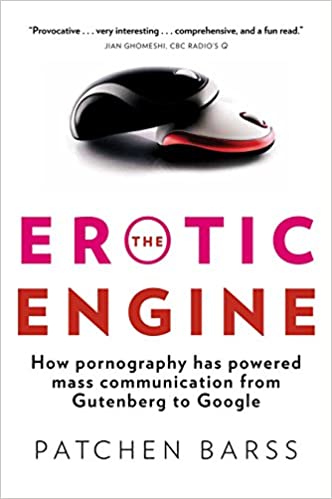
In 2009, while researching The Erotic Engine, I attended a spectacle known as the Adult Entertainment Expo. Prepping to turn in on my first evening there, I popped a vitamin pill (and no, that is not code for anything) that lodged in my throat, cutting off my breathing. My face in the mirror was a contorted combination of panic and resignation.
“This is the way it ends,” I thought. “I die alone in a hotel room. Choking on a pill. In Vegas. At a porn convention.”
Of course, it didn’t end that way but that breathless moment provided stark clarity of exactly how far I’d strayed from my familiar life.
How did I get there? Twenty years ago, I got a job in the computer department at a major city newspaper. I parlayed this role into a weekly technology column. Over many years as a tech writer, I became increasingly aware both that pornography holds great sway over technological development and that few people want to talk about it.
When I began thinking about writing a book, this seemed like a natural subject—a major, rarely discussed phenomenon that has transformed the business and technology mass communications.
Traveling around the world researching the book I interviewed scores of people who work in the porn industry, as well as museum curators, media analysts, historians, and antiquarians. I found that the influence of erotic material goes far beyond modern technology, extending back to the cave drawings and Paleolithic sculptures that are the first recorded forms of human communication.
I discovered elements of this story that were quite positive—stories of liberation, education and new means of connecting intimately with other people. But there was also no shortage of ugliness.
I was focused on how porn accelerated technology, but I couldn’t ignore issues of sexism, violence, and exploitation that kept cropping up in my research. I had left my comfort zone, and felt a responsibility take readers along for the ride.
I actually expected to find that the people who do the grunt work in the adult industry—techies, marketers, programmers—would have temperaments much like those of their mainstream counterparts.
It wasn’t always so. True, I met many generous, thoughtful people who worked in the industry. But I also crossed paths with extreme personalities the likes of which I have never seen anywhere else.
Once out of my comfort zone, I never fully returned. Today, when I walk into a consumer electronics store, it sometimes makes me shudder to think about the provenance of all that technology. (I did an informal assessment at a Best Buy after finishing the book. I estimate roughly 80 percent of their products owe a major debt to the world of pornography.)
I don’t regret this journey. In the end, I’d rather know than not know where my technology comes from. Still, parts of this story will always remain a tough pill to swallow.

